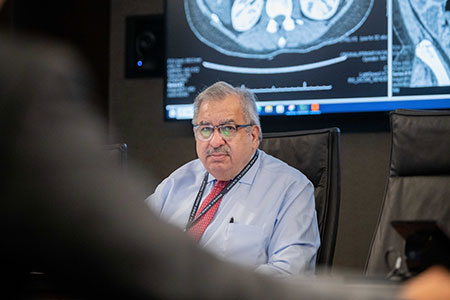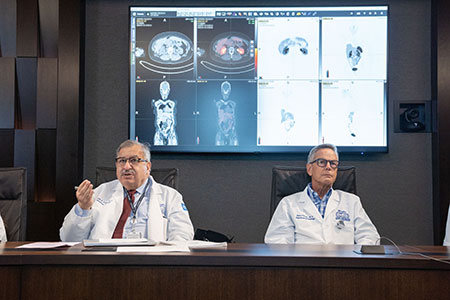What is neuroendocrine tumor?
Neuroendocrine tumors, at times referred to carcinoid tumors, form in specialized cells within the body’s neuroendocrine system. These cells share some characteristics with nerve cells, but they can also produce certain hormones. While neuroendocrine tumors can be found anywhere in the body, many form in the gastrointestinal tract or lungs. In many cases, the exact cause is unknown. They are rarely due to hereditary conditions.
There are two main types of neuroendocrine tumors: “functional” and “nonfunctional”. What makes a tumor functional is whether it releases certain chemicals into the bloodstream that result in a unique condition. The most well-known condition is the carcinoid syndrome. Carcinoid syndrome occurs when a carcinoid tumor secretes chemicals into your bloodstream, causing a variety of signs and symptoms (insert hyperlink to anchor link to below content on symptoms). A carcinoid tumor, which is a type of neuroendocrine tumor, occurs most often in the gastrointestinal tract or the lungs. In addition, doctors define neuroendocrine tumors using two other factors, the “stage” (extent of growth or spread) and “grade” (how fast the tumor is growing and spreading).
Leading neuroendocrine tumor care
As a rare and complex condition, where you go for treatment matters. The level of a program’s neuroendocrine tumor expertise, as well as having access to the latest therapies, are both key to getting the most effective and safest treatment. At our clinic, we perform a comprehensive assessment and provide personalized care for this challenging condition. We offer:
.svg?iar=0&hash=F6049510E33E4E6D8196C26CCC0A64A4)

/hfh-logo-main--white.svg?iar=0&hash=ED491CBFADFB7670FAE94559C98D7798)
 A diagnosis of cancer--any type of cancer--can feel overwhelming. At Henry Ford Health, you will find compassion and ongoing support from experienced neuroendocrine cancer specialists. Our team of doctors and nurses offers everything you and your family need: rapid diagnosis, personalized care, and expert treatment.
A diagnosis of cancer--any type of cancer--can feel overwhelming. At Henry Ford Health, you will find compassion and ongoing support from experienced neuroendocrine cancer specialists. Our team of doctors and nurses offers everything you and your family need: rapid diagnosis, personalized care, and expert treatment. 

 Our team is conducting ongoing research to improve existing therapies and investigate newer therapies and instruments that can offer additional treatment options.
Our team is conducting ongoing research to improve existing therapies and investigate newer therapies and instruments that can offer additional treatment options.